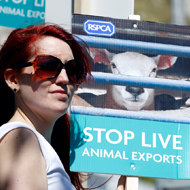RSPCA celebrates 200 years of animal welfare legislation

"There is still much work to do and many animal welfare problems that could and should be addressed with legislation" - David Bowles, RSPCA.
The RSPCA is today (22 July) celebrating 200 years since the first piece of animal welfare legislation was introduced to the world.
The Cruel Treatment of Cattle Act 1822, also known as Martin's Act, is named after campaigning MP Richard Martin – who also founded the RSPCA with William Wilberforce and Arthur Broome two years later.
Following the introduction of this Act, a number of Cruelty to Animals Acts were launched in the 1800s and later combined into the 1911 Protection of Animals Act and updated in the 2006 Animal Welfare Act.
The RSPCA still aims to provide better legal protection for animals to this day through new laws such as the Animal Welfare (Sentencing) Act 2021. Strongly promoted by the RSPCA, the Act increases the maximum sentence for the worst animal cruelty offences from six months to five years in England and Wales.
David Bowles, head of public affairs at the RSPCA, said: “The UK has much to be proud of when it comes to animal welfare.
“Much progress has been made since Martin’s Act was passed 200 years ago and we should be proud of the role this Act played to improve conditions for animals in the UK and the development of animal welfare law globally.
“However, there is still much work to do and many animal welfare problems that could and should be addressed with legislation. 200 years after Martin’s Act improved conditions for cattle being driven to market, the UK Government has yet to ban the export of live cattle for slaughter and further fattening. They could do this immediately by passing the Animal Welfare (Kept Animals) Bill, which has been ignored in the Commons for nine months.
“Sadly, some of the many calls we receive now are still around the same issues we were facing all those years ago at our inception - including deliberate cruelty, mutilations and even outdated practices such as dog and cock fighting.
“We will continue to advocate for animals for as long as they need us, and to build on the work of Richard Martin, we still have much left to achieve to live in a kinder world.”



 The latest
The latest